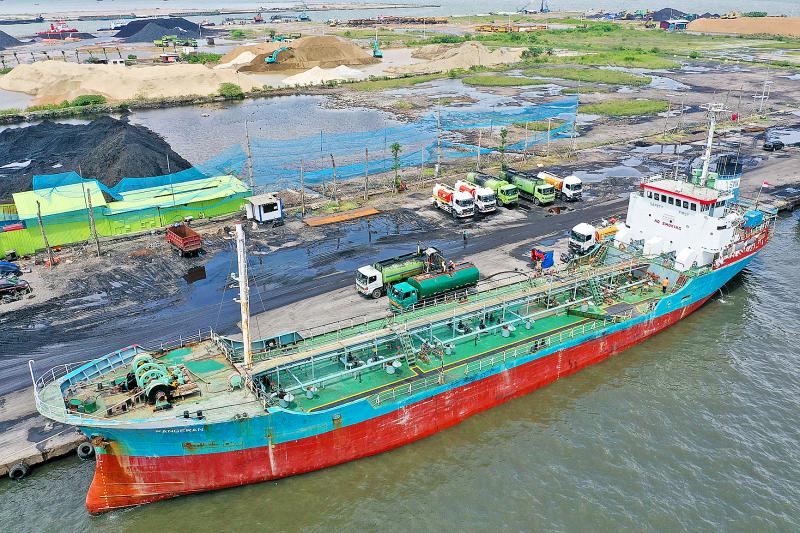The Indonesian Navy has seized a tanker that was carrying palm oil out of the country in contravention of an export ban, a spokesman said on Saturday.
Indonesia, the world’s largest producer of palm oil, prohibited its export last week to rein in skyrocketing domestic prices and shortages.
An Indonesian warship on Wednesday intercepted the Singapore-flagged MV Mathu Bhum, which was carrying 34 containers of palm olein, as it headed for Malaysia, navy spokesman Agung Prasetiawan said in a statement.

Photo: Bloomberg
Indonesia produces about 60 percent of the world’s palm oil, which is used in a range of products such as cosmetics and chocolate spreads. A third of its output is consumed domestically.
Vegetable oils are among the staple food items that have seen prices hit record highs in the past few weeks following Russia’s invasion of agricultural powerhouse Ukraine, the UN Food and Agriculture Organisation said.
Producers in Indonesia have been reluctant to sell at home because exporting is more profitable with high international prices.
Authorities stepped in to control prices, fearing public anger as consumers in several cities were forced to wait for hours at distribution centers to buy cooking oil at subsidized rates.
The Indonesian export ban sent prices of palm, soybean, European rapeseed and canola oils to historic highs.
It plans to resume exports when the local bulk price of cooking oil falls to 14,000 rupiah (US$0.97), having soared in recent weeks to 26,000 rupiah.
The price had dropped to 17,200 rupiah by Friday.

GROWING OWINGS: While Luxembourg and China swapped the top three spots, the US continued to be the largest exposure for Taiwan for the 41st consecutive quarter The US remained the largest debtor nation to Taiwan’s banking sector for the 41st consecutive quarter at the end of September, after local banks’ exposure to the US market rose more than 2 percent from three months earlier, the central bank said. Exposure to the US increased to US$198.896 billion, up US$4.026 billion, or 2.07 percent, from US$194.87 billion in the previous quarter, data released by the central bank showed on Friday. Of the increase, about US$1.4 billion came from banks’ investments in securitized products and interbank loans in the US, while another US$2.6 billion stemmed from trust assets, including mutual funds,

Micron Memory Taiwan Co (台灣美光), a subsidiary of US memorychip maker Micron Technology Inc, has been granted a NT$4.7 billion (US$149.5 million) subsidy under the Ministry of Economic Affairs A+ Corporate Innovation and R&D Enhancement program, the ministry said yesterday. The US memorychip maker’s program aims to back the development of high-performance and high-bandwidth memory chips with a total budget of NT$11.75 billion, the ministry said. Aside from the government funding, Micron is to inject the remaining investment of NT$7.06 billion as the company applied to participate the government’s Global Innovation Partnership Program to deepen technology cooperation, a ministry official told the

Taiwan Semiconductor Manufacturing Co (TSMC, 台積電), the world’s leading advanced chipmaker, officially began volume production of its 2-nanometer chips in the fourth quarter of this year, according to a recent update on the company’s Web site. The low-key announcement confirms that TSMC, the go-to chipmaker for artificial intelligence (AI) hardware providers Nvidia Corp and iPhone maker Apple Inc, met its original roadmap for the next-generation technology. Production is currently centered at Fab 22 in Kaohsiung, utilizing the company’s first-generation nanosheet transistor technology. The new architecture achieves “full-node strides in performance and power consumption,” TSMC said. The company described the 2nm process as

JOINT EFFORTS: MediaTek would partner with Denso to develop custom chips to support the car-part specialist company’s driver-assist systems in an expanding market MediaTek Inc (聯發科), the world’s largest mobile phone chip designer, yesterday said it is working closely with Japan’s Denso Corp to build a custom automotive system-on-chip (SoC) solution tailored for advanced driver-assistance systems and cockpit systems, adding another customer to its new application-specific IC (ASIC) business. This effort merges Denso’s automotive-grade safety expertise and deep vehicle integration with MediaTek’s technologies cultivated through the development of Media- Tek’s Dimensity AX, leveraging efficient, high-performance SoCs and artificial intelligence (AI) capabilities to offer a scalable, production-ready platform for next-generation driver assistance, the company said in a statement yesterday. “Through this collaboration, we are bringing two